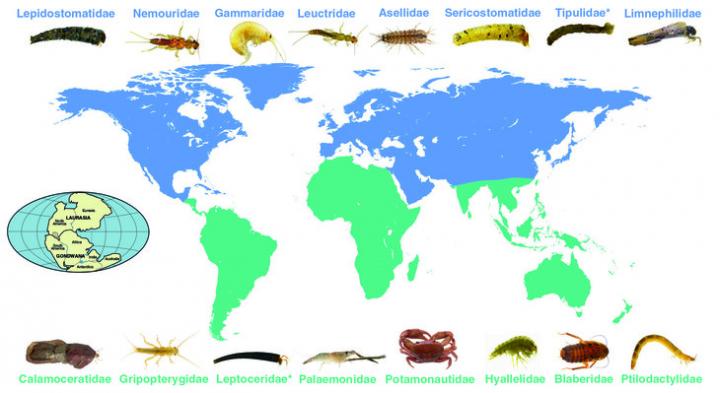
Credit: Bradley Cardinale Lab, Penn State
UNIVERSITY PARK, Pa. — The fast-moving decline and extinction of many species of detritivores — organisms that break down and remove dead plant and animal matter — may have dire consequences, an international team of scientists suggests in a new study.
The researchers observed a close relationship between detritivore diversity and plant litter decomposition in streams, noting that decomposition was highest in waters with the most species of detritivores — including aquatic insects such as stoneflies, caddisflies, mayflies and craneflies, and crustaceans such as scuds and freshwater shrimp and crabs.
Decomposition is a biological process that’s vital to life, explained study co-author Bradley Cardinale, professor and head of the Department of Ecosystem Science and Management, College of Agricultural Sciences, Penn State.
“The plant matter that doesn’t get eaten by animals ultimately dies and must be recycled so that biologically essential nutrients are rereleased into the environment where they can be used again by plants,” he said. “If that process of decomposition doesn’t occur, or slows significantly, then life comes to a screeching halt. Phosphorus, nitrogen and other nutrients that we need as humans don’t even exist in a biologically available form unless they get decomposed and recycled.”
But all over the world, detritivore populations are dwindling and disappearing at an alarming rate — a grim reality that spurred the study. There is good evidence that the rate of extinction for these organisms is 1,000 to 10,000 times faster than has occurred through the historic record, Cardinale pointed out.
“There has been a huge question about whether or not the diversity of these aquatic insects and crustaceans is crucial,” Cardinale said. “If they go extinct, is this biological process of decomposition going to slow or not? We didn’t have a good answer prior to this study. We didn’t know if the extinction of these animals will greatly affect the ability of ecosystems to sustain life, or if other organisms such as bacteria and fungi will fill the ecological niche and accomplish a similar level of decomposition.”
There are a number of causes of extinction, Cardinale said. In order of importance, they are habitat loss, overharvesting (which doesn’t apply to this study), competition from invasive species, disease, pollution and climate change — which he called “the big unknown at this point.”
The study was global and uncommonly robust, involving 75 scientists analyzing decomposition in 38 headwater streams that were similar in size, depth and physical habitat across 23 countries on six continents. Most of the streams selected by the researchers had rocky substrate and were shaded by dense riparian vegetation.
At each site, the researchers incubated identical plant litter mixtures comprised of nine species collected at different locations around the world and distributed among study partners. Litter mixtures were enclosed within paired coarse-mesh and fine-mesh litterbags containing the same amount and type of litter.
“The two types of litterbags allowed us to quantify the amount of decomposition done by detritivores and by microbial organisms in the streams,” Cardinale said. “We saw that in the litter enclosed by fine mesh bags that couldn’t be accessed by aquatic insects or crustaceans, much less decomposition took place.”
That indicates that bacteria and fungi alone likely can’t accomplish the amount of decomposition needed in stream ecosystems, he added.
“When we excluded these animals, we saw a huge drop in decomposition rates, which means other organisms didn’t compensate for them,” Cardinale said. “When the detritivores were excluded, simulating extinction, we lost way more than 50% of the decomposition in the streams.”
In findings recently published in Nature Communications, the researchers noted that streams with an abundance of detritivores had the highest rates of decomposition. They reported that the relationship between detritivore diversity and decomposition was stronger in tropical areas than in temperate areas and absent in boreal areas, and that abundance and biomass were important in temperate and boreal areas, but not in tropical areas.
According to the research team, the study results suggest that litter decomposition likely is being altered by detritivore extinctions and that these effects are particularly strong in tropical areas, where detritivore diversity already is relatively low and some environmental stressors are particularly prevalent.
Some of the study results are not surprising, Cardinale suggested. The abundance and size of detritivores are known to have a very strong impact on decomposition. So, streams that have more of them — or that have larger invertebrates, such as big crabs and shrimp — have more decomposition.
“But what was a surprise is that we also found that the diversity, the number of different species that were in streams, was one of the most dominant predictors of decomposition,” he said. “And between abundance, body size and diversity, we could explain 82% of all of the global variation in decomposition. That means as these animals go extinct, we’re going to lose the ability to decompose and recycle biologically essential materials that other organisms require for survival and growth.”
###
Luz Boyero, research professor with the University of the Basque Country, Spain, was lead author of the study. Cardinale spearheaded the North American portion of the research.
The Basque Government in Spain funded this work.
Media Contact
Sara LaJeunesse
[email protected]
Original Source
https:/
Related Journal Article
http://dx.




